Related Research Articles
The Memphis Horns was an American horn section, made famous by their many appearances on Stax Records. The duo consisted of Wayne Jackson on trumpet and Andrew Love on tenor saxophone. An "offshoot of the Mar-Keys", they continued to work together for over 30 years. They lent their sound to 83 gold and platinum awards and over one hundred high-charting records, including Otis Redding's "(Sittin' On) The Dock of the Bay", Al Green's "Let's Stay Together", and Elvis Presley's "Suspicious Minds".

Beautiful Loser is the eighth studio album by American rock artist Bob Seger, released in 1975. This album marked Seger's return to Capitol Records after a four-year split. His previous record with Capitol was Brand New Morning in 1971.
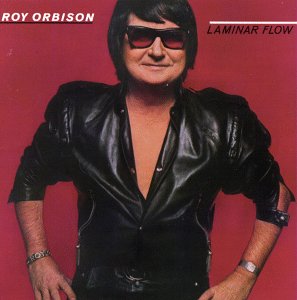
Laminar Flow is an album by the American musician Roy Orbison. It was recorded at Wishbone Recording Studio in Muscle Shoals, Alabama, and released in 1979 by Asylum Records. It was the last album of new material Orbison would release in his lifetime. His next studio effort, In Dreams, featured re-recordings of old Orbison hits while Mystery Girl and King of Hearts, his final collections of all-new material, were released posthumously. "Hound Dog Man" is a tribute to Elvis Presley.

"Whatever Gets You thru the Night" is a song written by John Lennon, released as a single in 1974 on Apple Records, catalogue number Apple 1874 in the United States and Apple R5998 in the United Kingdom. In the U.S. it peaked at No. 1 on all three record charts: Billboard Hot 100, Cashbox, and Record World, and at No. 36 in the UK. It was the lead single for Lennon's album Walls and Bridges; in the UK the single was released on the same day as the album. "Whatever Gets You thru the Night" was Lennon's only solo No. 1 single in the United States during his lifetime, making him the last member of the Beatles to finally reach the top of the charts. In Canada, the single spent two weeks at No. 2, and became the 30th biggest hit of 1974.
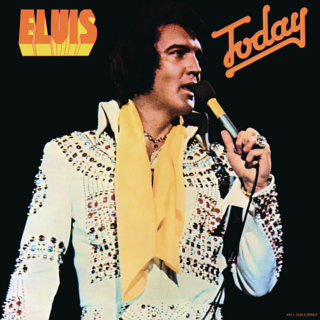
Today is the twenty-second studio album by American singer Elvis Presley, released on May 7, 1975 by RCA Records. The album featured the country and pop music sound typical of Elvis during the 1970s, as well as a new rock and roll song, "T-R-O-U-B-L-E", which was released as its first single and went Top 40 in the US. "Bringing It Back" was its second single in the US. The album also features covers of songs by Perry Como, Tom Jones, The Pointer Sisters, Billy Swan, Faye Adams, The Statler Brothers and Charlie Rich.
"I Never Loved a Man (The Way I Love You)" is a 1967 single released by American soul singer Aretha Franklin. Released on Atlantic Records as the first big hit of her career and the lead single from her tenth studio album of the same name, it became a defining song for Franklin, peaking at number one on the rhythm and blues charts and number nine on the pop charts. The B-side was "Do Right Woman, Do Right Man". Before this Franklin had placed only two Top 40 singles on the pop chart during her modest tenure with Columbia Records.
The Muscle Shoals Rhythm Section is a group of American session musicians based in the northern Alabama town of Muscle Shoals. One of the most prominent American studio house bands from the 1960s to the 1980s, these musicians, individually or as a group, have been associated with more than 500 recordings, including 75 gold and platinum hits. They were masters at creating a southern combination of R&B, soul and country music known as the "Muscle Shoals sound" to back up black artists, who were often in disbelief to learn that the studio musicians were white. Over the years from 1962 to 1969, there have been two successive groups under the name "Muscle Shoals Rhythm Section" and the common factor in the two was an association with Rick Hall at FAME Studios in Muscle Shoals.

Muscle Shoals Sound Studio is an American recording studio in Sheffield, Alabama, formed in 1969 by four session musicians known as The Muscle Shoals Rhythm Section. They had left nearby FAME Studios in Muscle Shoals to create their own recording facility.
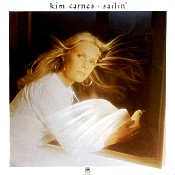
Sailin' is the third studio album by Kim Carnes, released in 1976. The record was recorded, in part, in Muscle Shoals, Alabama with the famed Muscle Shoals Rhythm Section. Although this album hasn't been released on CD, all of the album's songs can be found on the European CD "Kim Carnes - Master Series" released by A&M in 1999.

Two Days Away is an album by Elkie Brooks, released in 1977.

Skynyrd's First and...Last was the original name of the posthumous compilation album first released in 1978 by the rock band Lynyrd Skynyrd. In 1998, it was repackaged, renamed and re-released as Skynyrd's First: The Complete Muscle Shoals Album, being expanded to include eight additional tracks – four of which were previously unreleased and four which would be re-recorded for (Pronounced 'Lĕh-'nérd 'Skin-'nérd). As the renamed title suggests, the album was recorded at Muscle Shoals Sound Studio in Alabama. Originally intended to be their debut album it was shelved, making (Pronounced 'Lĕh-'nérd 'Skin-'nérd) their actual debut. The album was certified Gold on September 8, 1978 and Platinum on November 10, 1978 by the RIAA.
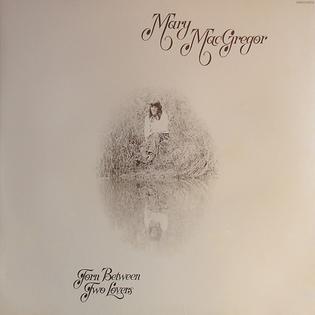
Torn Between Two Lovers is the debut album by Mary MacGregor. It was produced and partly written by Peter Yarrow, and released in 1976.
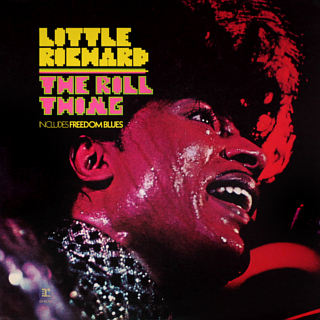
The Rill Thing is Little Richard's first album for Reprise Records, released in August 1970. It was considered a comeback album for Richard, following a three-year hiatus on new albums and an acclaimed performance at Atlantic City Pop Festival. The album utilizes a soul-influenced sound and contains Little Richard's biggest post-Specialty single in "Freedom Blues", which broke the Billboard top 50. The follow-up single, "Greenwood, Mississippi" made the top 100 and number 56 on Cashbox Black Singles. Despite the success of the singles, the album failed to chart.
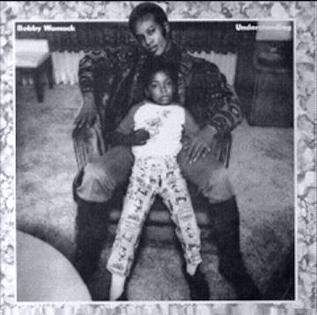
Understanding is the fourth studio album by American musician Bobby Womack. The album was released on March 30, 1972, by United Artists Records. Womack recorded Understanding in Memphis, Tennessee at American Sound Studio and in Muscle Shoals Sound Studios in Muscle Shoals, Alabama. At Muscle Shoals, he utilized top session players, including drummer Roger Hawkins, guitarists Jimmy Johnson and Tippy Armstrong, bassist David Hood and keyboardist Barry Beckett.
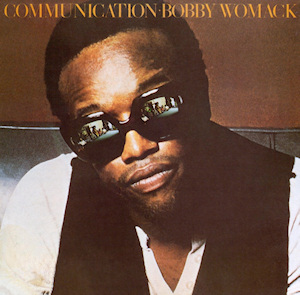
Communication is the third studio album by American musician Bobby Womack. The album was released on September 15, 1971, by United Artists Records. It reached No. 5 on the Billboard R&B chart and No. 20 on the Billboard Jazz Chart in 1972. It included the hit single, "That's The Way I Feel About Cha", which charted at No. 2 on the Billboard R&B Singles chart and No. 27 on the Billboard pop chart. The album became Womack's breakthrough spawning the hit single "That's The Way I Feel About Cha" and a favorite Womack album track, "(If You Don't Want My Love) Give It Back", which Womack recorded three times after the original, the first remake, a slower acoustic version, was issued on the soundtrack of the film, Across 110th Street, and an instrumental by J. J. Johnson's band. The fourth time Womack recorded it was with Rolling Stones singer and musician Ron Wood. Womack recorded his own versions of James Taylor's "Fire and Rain", Ray Stevens' "Everything Is Beautiful" and featured a spoken word monologue in his cover of the Burt Bacharach and Hal David standard, "(They Long To Be) Close to You".
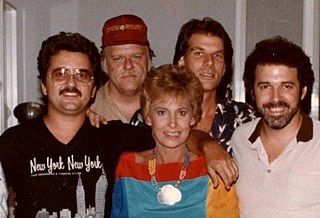
Barry Edward Beckett was an American keyboardist, session musician, record producer, and studio founder. He is best known for his work with David Hood, Jimmy Johnson, and Roger Hawkins, his bandmates in the Muscle Shoals Rhythm Section, which performed with numerous notable artists on their studio albums and helped define the "Muscle Shoals sound".

Smokestack Lightning is the second solo album by Mike Harrison, most notable as a principal lead singer for Spooky Tooth. The album was released on Island Records in 1972 and was co-produced by Chris Blackwell and Mike Harrison. The album was recorded at the Muscle Shoals Sound Studio in Alabama with the Muscle Shoals Rhythm Section.

The Musicians Hall of Fame and Museum (MHOF) in Nashville,Tennessee honors all musicians regardless of genre or instrument. A large portion of the exhibits are related to session musicians who often were not credited for their work at the time. The MHOF timeline starts with the beginning of recorded music and inductees are nominated by current members of the American Federation of Musicians and by other music industry professionals.

All the Love in the World is a 1974 album by American singer-songwriter Mac Davis released on Columbia Records immediately following his album Stop and Smell the Roses also released in 1974. It peaked at number 21 on the Billboard 200 albums chart and reached number 6 on Billboard's Top Country Albums chart. It also charted in Canada reaching 33 on the country's RPM charts. Containing many hits including "(If You Add) All the Love in the World" and very notably "Rock 'N' Roll " written by Kevin Johnson covered later by Johnson himself, by Terry Jacks, The Cats and many others, the album was certified gold in the United States.
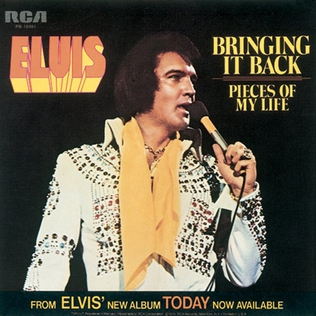
"Bringing It Back"[A] is a song written by Gregg Gordon and originally recorded by Elvis Presley for his album Today.
References
- 1 2 Muscle Shoals Horns, Discogs.com. Retrieved 1 May 2016
- 1 2 Robert Palmer, "Muscle Shoals Horns founder Harrison Calloway dead at 75", TimesDaily.com, May 1, 2016. Retrieved 1 May 2016
- ↑ Muscle Shoals, Encyclopedia of Appalachia. Retrieved 1 May 2016
- 1 2 3 Lisa Singleton-Rickman, "Legendary Muscle Shoals Horns reunite for CD release", TimesDaily.com, 31 May 2015. Retrieved 1 May 2016
- ↑ Whitburn, Joel (1996). Top R&B/Hip-Hop Singles: 1942-1995. Record Research. p. 318.